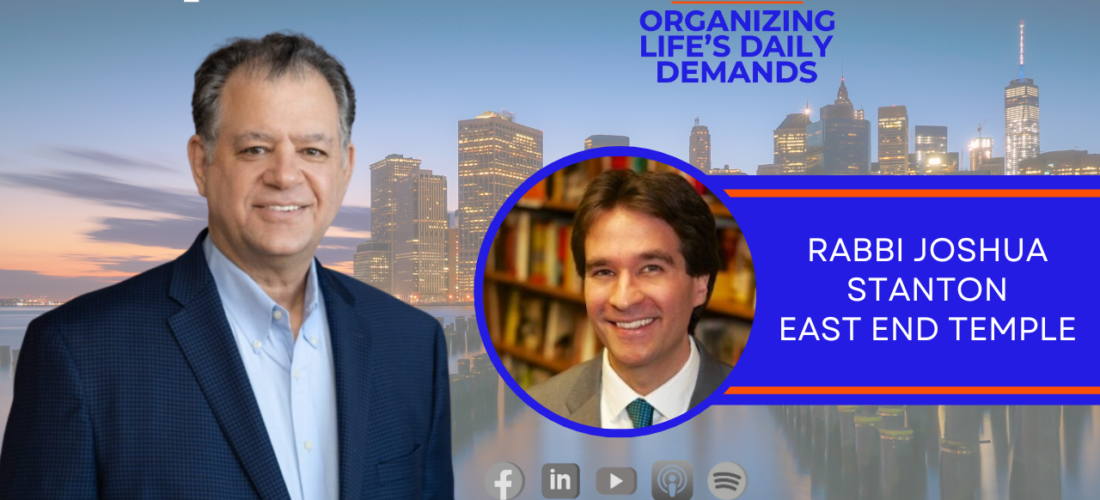
Spirituality and End of Life Planning
- Posted by Peter Gordon
- On May 1, 2023
- 0
Welcome to “Organizing Life’s Daily Demands.” I’m Peter Gordon, the president of New York Financial Organizers. We help people pay their bills, process insurance claims, and do other things required for the daily demands of personal finance. My guest is Rabbi Josh Stanton. I know Josh through my temple, which is East End Temple in Manhattan, and Josh and I have developed a close relationship. He’s a remarkable individual, and I think he fits in really well with the theme of dealing with life’s daily demands. Josh is the rabbi at East End Temple, and he also does a lot of interfaith work through an organization called CLAL: The National Jewish Center for Learning and Leadership. Any clergyperson who is worthwhile does a lot more learning than teaching. So Josh has the privilege of learning from some incredible people in his community. Spirituality has taken a big role in my life over the years, and I wanted to ask: what does that word mean?
“We have two ears and one mouth”
Josh:
What’s spirituality?
One way that I talk about it is as something that is very small or very big and the connection between the two. Spirituality can originate within us. It can be a sense that there is something connecting us to other people. There is something within us that is inherently good, that we didn’t necessarily place within ourselves, but that was placed there by God or somehow grew over time and exists within us. It’s also about things that are really big. Here we are, this one being in a world with billions of human beings and goodness knows how many other creatures, in a universe with how many planets. We’re really small. So, it is the wondering that we do about the things that are really small within us and are tiny relative to us, and then the things that are so big that they make us feel small. Spirituality stems from wonder and awe at our existence, which is at once so big and so important and so tiny and minuscule. It speaks to the question of who are we and why are we here. In many ways, you, Peter, are providing practical help and solutions for people who are encountering really big questions and dilemmas that relate to finance relate to time, but they relate to the question of why we’re here and what we’re supposed to be doing on Earth. That’s a lot to hold at once; the practical as well as the spiritual. How do you find a way to do it?
Peter:
So, I actually thrive on it. I really enjoy that aspect of the work we do and that it’s not just paying bills. It’s really helping people cope and being able to be there for them when they need us in a variety of ways. There are a lot of, I like to describe our work as 50% bookkeeping and 50% social work. Essentially, for me, social work is spirituality. It’s being spiritual, and the way I think of spirituality is putting others before myself. That’s why I’m well-suited for this job because I do enjoy that, and I find myself very often getting into pretty deep conversations with clients. It’s not unusual, obviously, it depends on the client, but as I mentioned, I kind of thrive on that.
How does the daily demand of our lives change at different stages of life? Do you want to address that?
Josh:
Yes, it never ceases to amaze me. I’m going to start by talking about my four-year-old, and I feel like there are even these micro-stages when you’re looking at a kid. Every couple of weeks, it feels like whatever worked before doesn’t work anymore. And I’ve always wondered if adults are the same way, we’re just not paying enough attention. As adults, we often think of the big stages. We often think of emerging adulthood when you’re blessed to go to college, go to a professional school, or enter the workforce after high school. You’re sort of figuring it out for five or ten years, and then all of a sudden, it’s like, ‘Oh, I’m not so new at this anymore,’ and, God willing, I’ve hit my stride or found a path that is good or at least good enough for now. Some people settle down and find a partner, but so much of that gets erased because, no, you’re just an adult, and everything very often in our society is rooted based on the stage of career, as opposed to the stage of human development. The next stage is like, you’re going from emerging adulthood where you find your career, to adulthood where you’re working, and it’s presuming, of course, that everyone wants to be in the workforce and is working outside the home and whatever, but then there’s retirement and sort of a set of years when, hopefully, you’ve achieved financial stability. It goes through some major shifts, but it’s very dehumanizing. I’ve never met a person who just said, “Yup, I found my career, I worked, I retired, and now I’m retired.” I’ve just never met a person who said that. It actually brought to mind what you said, a prayer that life is a journey, and it’s not looking at the destination, but looking at the actual journey. When I talk to people, it varies. I would say that for most people I speak to, there’s very little regret.
Peter:
You know, they’re just trying to cope with whatever issues they’re currently having. Difficult it can be for them, you know, it’s kind of sad, but that’s where we come in and try to help them. And I like saying that we’re a spoke in the wheel, so we’re just one piece of the puzzle, and it’s really important to have others, in our case, professionals help our clients, as well as family members, to support that individual. And obviously, it’s a case where everyone’s different, but we just try to be there for our clients. You know, when I learned how to deal with that and actually I’ve had my own experience with my mom and communicating with individuals who have Alzheimer’s or dementia. What I find is it’s critical to treat them as if they don’t have that and just talk to them as a very normal person and be there for them and be honest and caring, and it works. You know, studies have shown that the people who are ‘happiest’ are those who have relationships in their lives. It’s not about material possessions, although that helps some people. It’s really about the quality of the relationships in your life. I know when I was younger, I sought community and to connect with others in a congregation, whatever the affiliation is, and I’ve seen it in our own congregation. So, you’re describing what I love: you need something to ground you spiritually, whatever that might look like or feel like, or something to ground you in that which is beyond yourself, and something to connect you in a relational way. I keep hearing from people, that this is probably a pandemic-related phenomenon, of a third space. You need a space that’s not your primary, but I kind of do have that, in a way that’s fascinating. So, how do you incorporate spirituality into daily life?
Josh:
I would say one of the great ironies for many clergies is that we had beautiful spiritual practices until we became clergy, and now there’s this funny co-mingling of our spiritual lives and our professional lives. I had an amazing Shabbat practice until, like, a month or two after my ordination, and then all of a sudden, my Shabbat practice, in my community, taken to sitting in bed with my wife before we close our eyes, and we just sit there in silence for 10 minutes. And if I need to pray, I pray. If I need to just hear and listen, I do that. And I also take a lot of time for study and for writing. A lot of people forget or overlook the possibility of studying as a spiritual practice. Our first book, 18 months of debating, discussing, arguing, self-critiquing, and asking questions we never had the courage to ask before. And so, part of it is learning on my own part way, and I find writing to be very therapeutic also, and I don’t do it enough, you know? I don’t really have a journal, but I find that I have a notebook, and I’ll write things down when I need to and just recap the day, and that’s often very helpful. I also find that for me, connecting with people, as I’ve said, is really what’s spiritual, and I need to do that on a daily basis. Getting myself out of the equation and focusing on others is the best medicine for me. This is kind of ironic because it’s active, but it again pulls me out of my head, and it actually relaxes me. Afterwards, I’m just lost in my thoughts and just not focusing on work or any problems, just trying to lose myself in feeling the presence of something else, and that’s really good.
Peter:
Certainly, when dealing with clients, myself, my sister, my brother, our children, you know, my nieces, nephews, my sons, and you made that a serene moment. One of the things you said was that when somebody is close to death and you’re with them, that’s when you can be closest to God, and that really stayed with me. I knew everything, you know, my mother was ready, and I knew she was in the right place. And that’s why I spend my time helping others, and that’s where I feel serene. It’s like I’m kind of like the rearview mirror; I’m helping you see how you got to where you are and helping you retrace your steps so that you can act with greater knowledge and self-knowledge. And what people don’t know is what to do in those moments because you can’t train for them, you can’t prepare for them, and our society is really not very good at even speaking about moments of severe illness or the approach of possible death. And so, in helping you retrace your steps, I think if you felt solace or serenity by virtue of your love and how you expressed it. Thinking back to that, and then also when my father-in-law passed, very often when somebody is ready to move on, they have something of a recuperation. So my mother was very ill over the weekend, and then Monday morning, my sister called me and said, “Mom mom’s coming back, she’s coming back, you gotta come here,” and we had a wonderful time together. And it was like this last surge of energy, and bringing her to, and we were able to spend time. And a couple of days later she left. The same thing happened with my father-in-law, he made a decision. Those are times of true spiritual serenity. You don’t know when those times will come and you can’t prepare for it, but having a community helps a lot.
“You know, studies have shown that the people who are ‘happiest’ are those who have relationships in their lives.”
Connect with Rabbi Stanton:
Website – http://www.eastendtemple.org
LinkedIn – https://www.linkedin.com/in/joshuastanton
Facebook – https://www.facebook.com/EastEndTempleNYC
Instagram – https://www.instagram.com/eastendtemple

0 comments on Spirituality and End of Life Planning